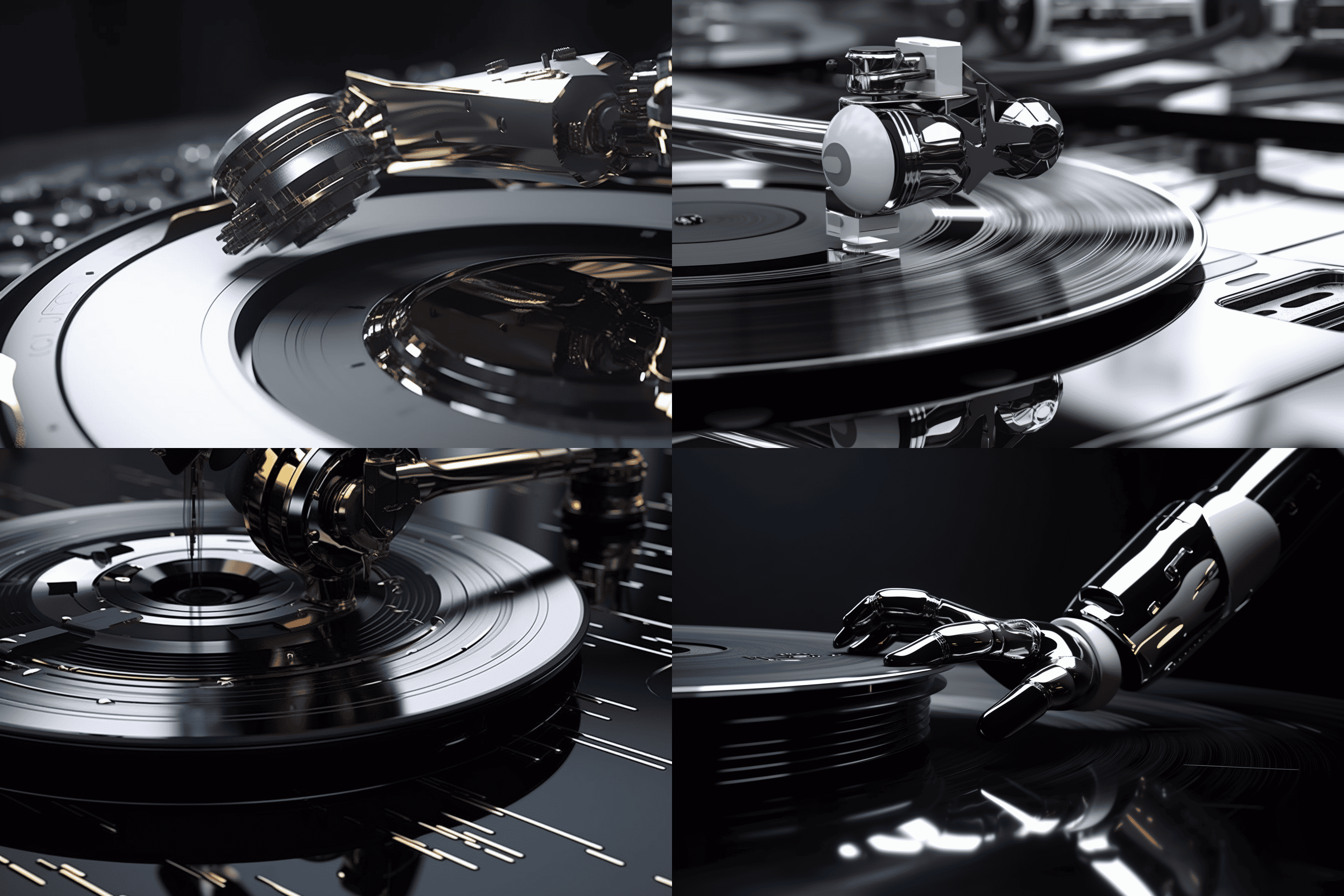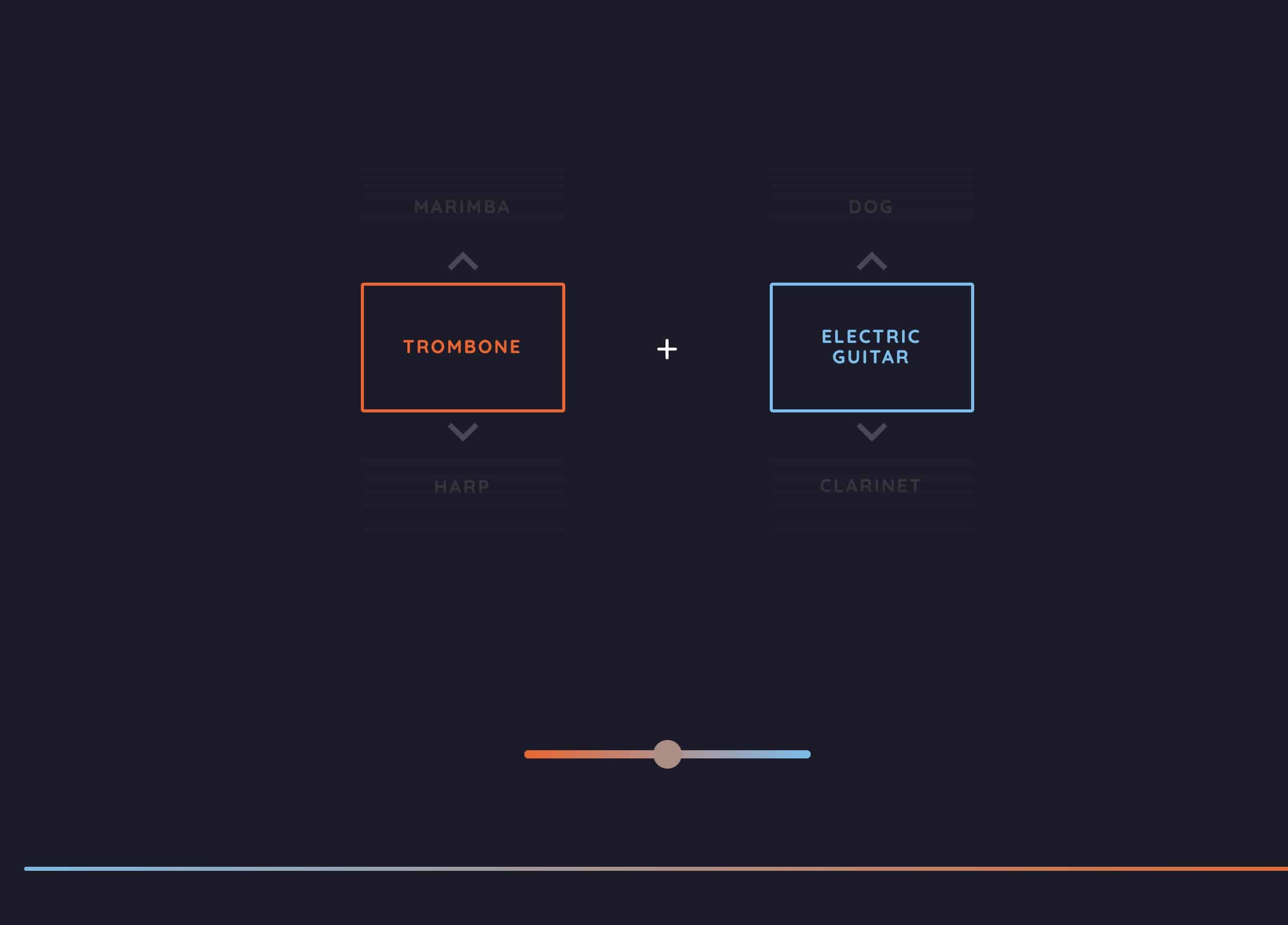Creating music is a complex process that requires a combination of knowledge and imagination to produce sounds that are engaging to the audience.
While it may seem intimidating, I’m here to show you that with the help of artificial intelligence (AI), music production can be easier than ever before!
We’ll explore how AI is making its way into music production, from digital tools to creative challenges. Plus, we’ll discuss what this means for the future of music creation and where innovation will take us next.
Whether you’re a novice or an experienced producer, you’ll gain insight into how AI is revolutionizing the industry and learn about cutting-edge technology available today.
So let’s dive in and discover what AI can do for music production!
Overview of Music Production Technology
Music production technology has come a long way, and this overview dives into its intricate details to explore how far it’s progressed.
Audio engineering and MIDI sequencing have revolutionized the music production industry by allowing producers to create complex compositions with a few clicks of their mouse.
With audio engineering, producers can manipulate sound waves and instruments until the perfect blend is reached for each song.
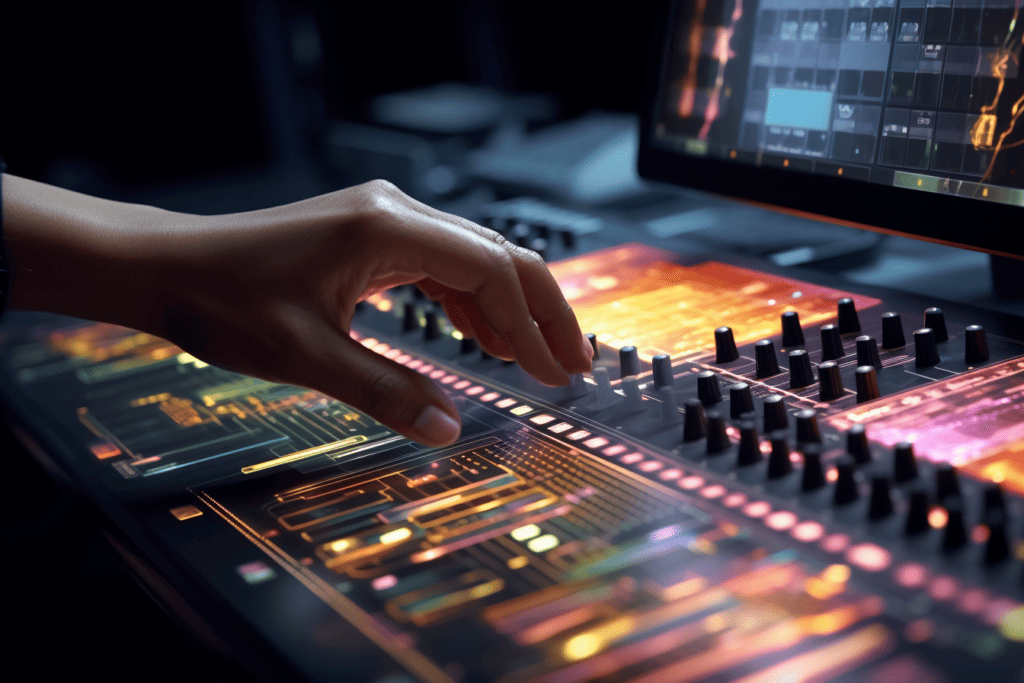
MIDI sequencing allows producers to precisely control timing and velocity values of individual notes in order to craft songs precisely as they envision them.
Beyond that, modern music production technology offers up a plethora of tools for manipulating sounds – from distortion effects to equalizers – that shape the final product more accurately than ever before.
All these advancements combined have enabled music production to reach new heights of innovation and creativity, deepening our appreciation for what can be accomplished through technology today.
This newfound understanding sets us up nicely as we move into exploring AI in music production next.
AI in Music Production
You can now use Artificial Intelligence to create and mix tracks, revolutionizing the way you make music. AI has quickly become a major player in music production, allowing audio engineers and composers to explore new possibilities for sound manipulation. Through its ability to recognize patterns and generate unique compositions, AI is enabling artists to push the boundaries of creativity.
AI can be used in various ways when creating or mixing songs:
- Audio Engineering: By analyzing audio signals from an instrument or microphone, AI can help identify appropriate levels of amplification, compression, equalization and other effects necessary for producing high-quality recordings.
- Music Composition: AI algorithms are capable of generating original melodies and chord progressions that couldn’t have been composed by a human alone. This allows musicians to take their own composition skills further with the help of machine learning technologies.
- Mixing & Mastering: Using deep learning models, machines are now able to adjust volume levels automatically in order to bring out the best qualities of each track while maintaining a consistent overall sound profile.
These advancements in AI technology allow producers and engineers to achieve greater accuracy and speed than ever before. This allows them more time to focus on creative decisions as opposed to technical ones. With this newfound freedom, artists are free to explore uncharted musical territory with confidence, knowing that their production will always remain high quality.
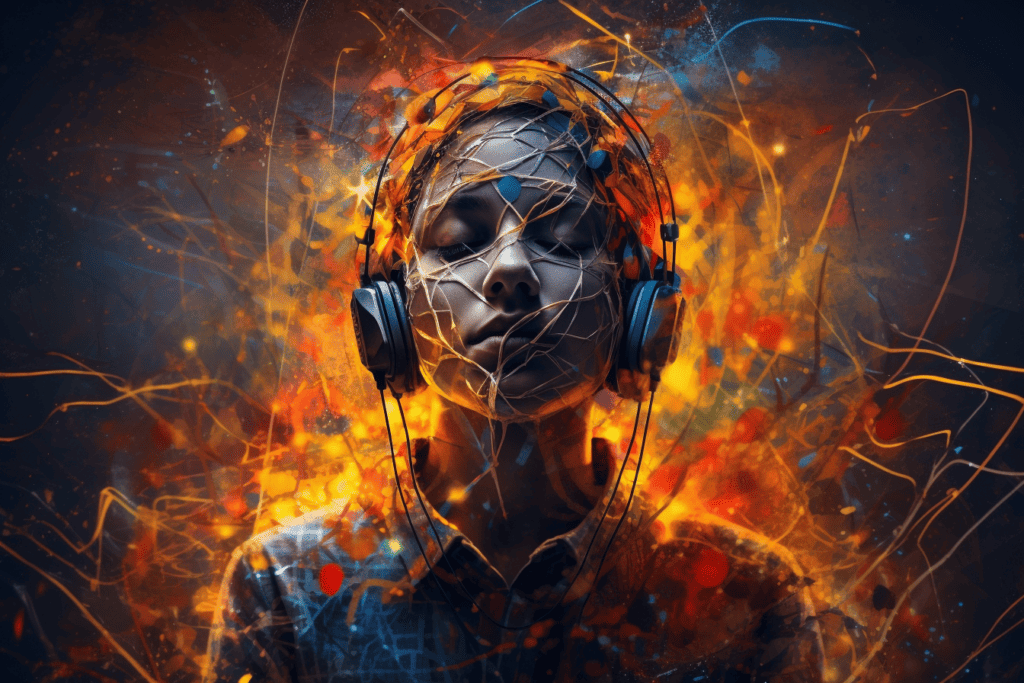
This opens up exciting opportunities for innovation within the industry, as well as provides aspiring producers with tools they need for success. With these digital tools at their disposal, it’s no wonder why so many people are turning towards AI-based music production solutions today.
Digital Tools for Music Production
Discover the power of digital tools for music production and experience a whole new world of sound manipulation!
Digital tools have revolutionized the way music is created. From audio interfaces and MIDI controllers to software plugins and virtual instruments, these technologies have enabled producers to create complex musical arrangements with unprecedented speed and accuracy.
The use of digital tools allows producers to easily record, edit, mix, and master their tracks from any location with access to the internet. This has opened up an entirely new realm of possibilities for musicians as they can now explore different techniques and sounds without having to rely on expensive hardware or studio time.

Furthermore, digital tools allow for greater flexibility when it comes to experimentation as producers can quickly make changes or undo them just as easily if something doesn’t turn out quite right. With these powerful tools in hand, it’s no wonder that many artists are turning towards digital technology as their go-to method for creating music.
From here, we can move on to discuss the challenges posed by AI in music production.
Challenges of AI in Music Production
Gaining a deeper understanding of how artificial intelligence is transforming the process of music production can be advantageous for any producer looking to stay ahead of the curve. AI technology has been incorporated into many aspects of music production, such as composition, sampling, and arrangement.
The potential of AI in this industry is immense; however, there are still challenges that need to be addressed before it can reach its full potential. Human-AI collaborations have proven to be an effective way to bridge this gap by leveraging machine learning algorithms or techniques such as natural language processing.
However, these collaborations require a great deal of trust between humans and machines, which can often be difficult to establish due to the lack of transparency about how exactly AI systems work or make decisions. Additionally, AI systems must learn from large amounts of data that require expensive computing power and storage capacity in order for them to produce reliable results; this challenge is even greater considering the huge variety and complexity that exists within different genres and styles of music.
Despite these challenges, there is no doubt that AI technologies have revolutionized the process of music production in unexpected ways over the past few years and will continue doing so moving forward.
The Future of Music Production
As AI capabilities continue to develop, it begs the question: where will music production go next? With its potential for creative collaboration and automation, the future of music production is sure to be an exciting one.
As AI technology continues to advance, we can expect a number of changes in how music is produced and shared. Here are four exciting advancements we may see:
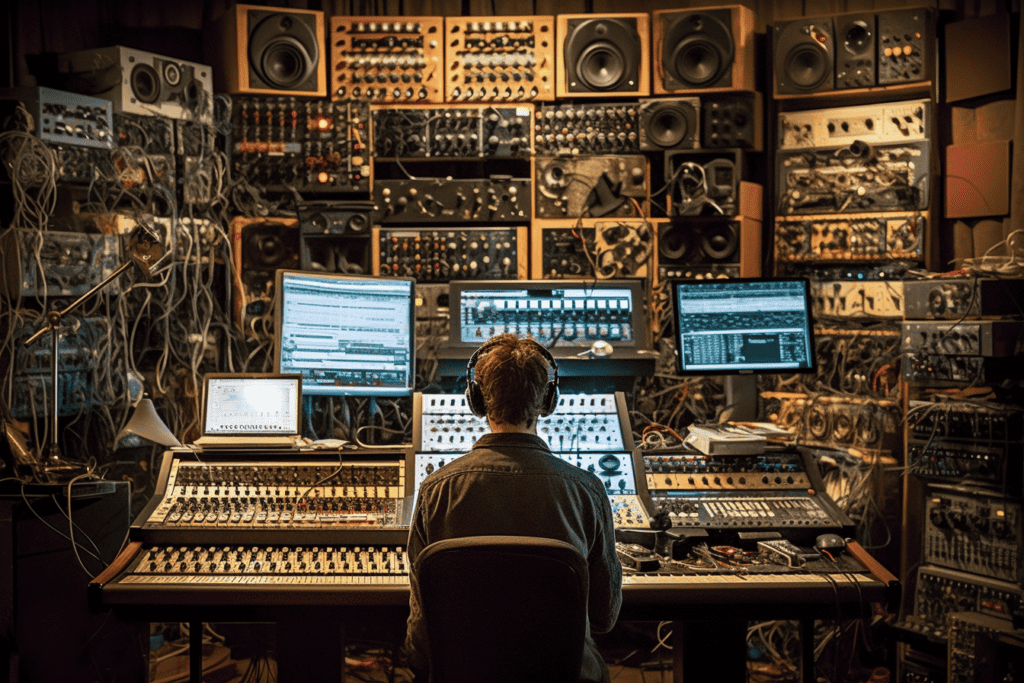
- Synthesized instruments that sound more realistic than ever before, allowing producers to create sounds that previously only existed in their imaginations.
- Multi-track editing becoming faster and easier through automated processes such as vocal pitch correction or drum beat quantization.
- Automated mixing tools that make it easier for producers to get professional-sounding mixes without having to manually adjust each track individually.
- Increased access to high-quality audio samples from all genres of music, enabling producers to quickly piece together tracks with ease.
These advances will open up new possibilities for music creators while also providing new opportunities for collaboration between artists and producers across genre boundaries.
The future of music production looks bright indeed!
Frequently Asked Questions
How can I learn to use AI to produce music?
As an aspiring music producer, I’m always looking for innovative ways to make my work stand out. Learning how to use AI to produce music is a great way to do that.
To start, it’s important to understand the basics of music theory and familiarize yourself with ethical implications of using AI in production. Once you have a foundational understanding, there are many resources available online that can help you learn more about utilizing AI in your own projects.
With practice and experimentation, you can create unique sounds and cutting-edge beats that will take your productions to the next level!
What are the benefits of using AI in music production?
Using AI for music production is an incredibly innovative way to take your sound to the next level. The possibilities are truly endless, from computerized instruments that can be programmed to create unique sounds to automated mixing that can adjust levels and EQ with ease. With just a few clicks of a button, you can have access to state-of-the-art technology, allowing you to craft intricate melodies and achieve unprecedented levels of sonic perfection.
The benefits of using AI for music production are immense. This technology opens up a world of opportunities for any artist looking for something fresh and exciting. It can help perfect complex arrangements quickly and efficiently, as well as create completely new sonic landscapes.
Is there a risk of AI replacing human music producers?
While automated tasks can help save time and energy, it’s important to note that the creative control of the music producer remains paramount. Ultimately, AI tools are only able to assist in the production process; they cannot replace a human producer’s intuition and creativity.
AI should instead be viewed as an additional tool that allows producers to focus on their craft while allowing automated processes to handle tedious, mundane tasks. This ultimately allows for more innovative and creative music production overall.
What are the ethical considerations of using AI in music production?
As I explore the ethical considerations of using AI in music production, it’s hard to ignore the juxtaposition of creativity and technology.
On one hand, data privacy is a major concern as companies look to protect the copyrights of their artists and customers.
On the other hand, there’s a subconscious desire for innovation that could be unlocked if we navigate these ethical dilemmas carefully.
It requires knowledgeable analysis of copyright laws and an understanding of how data can be used responsibly; however, with careful consideration, artificial intelligence can revolutionize music production and create new opportunities for everyone involved.
Is AI in music production accessible to everyone, regardless of skill level?
As AI technology continues to revolutionize music production, it’s important to consider whether it is accessible to everyone – regardless of skill level.
From a cost effectiveness perspective, the answer is yes; there are many affordable options available that allow novice users to create professional quality audio with relatively low startup costs.
However, the challenge lies in unlocking the artist creativity that comes from years of practice and experience.
While AI can provide some assistance by providing suggestions and automated processes, it still relies on a human touch when creating something truly unique and exciting.
Ultimately, while AI can be an invaluable tool for beginner music producers, its full potential will only be realized when used alongside experienced professionals who understand the nuances of creating great art.
Conclusion
To conclude, music production technology is a constantly evolving field. AI and digital tools are changing the way we make music and allowing for new creative possibilities.
As this technology continues to develop, it’s exciting to think about what new sounds might emerge as a result. It’s like a treasure trove of musical potential just waiting to be discovered.
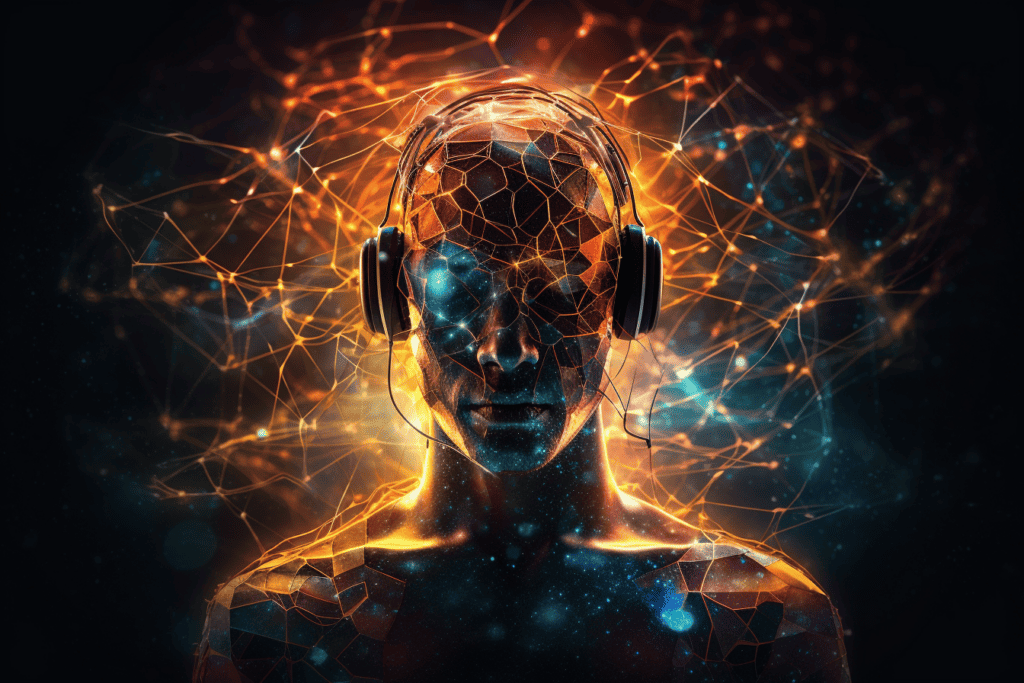
The future of music production looks bright and full of opportunity. While challenges remain in using AI in music-making, I’m confident that with time these will become less difficult.
As the technology evolves, we can look forward to ever more intricate pieces of art created with the help of AI and digital tools.

